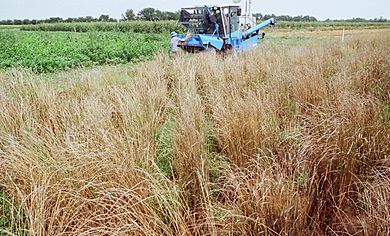The Land Institute facts for kids
 |
|
| Formation | 1 August 1976 |
|---|---|
| Founders | Wes Jackson, Dana Jackson |
| Type | Nonprofit organization |
| Purpose | Agricultural and social research |
| Headquarters | Salina, Kansas |
| Location |
|
|
President
|
Rachel Stroer |
|
Chief Scientist
|
Tim Crews |
|
Chief Impact Officer
|
Amy Cole |
|
Chief Operating Officer
|
Tracie Thomas |
| Chairperson of the Board | |
|
Key people
|
Julia Ollmsted |
|
Budget (2020)
|
$6 million USD |
|
Revenue (2020)
|
$6 million USD |
|
Staff (2020)
|
50 |
The Land Institute is a special organization in Salina, Kansas. It's a nonprofit group that does research, teaches people, and helps make rules about farming. Their main goal is to create a way of farming that uses perennial crops. These crops live for many years, like wild plants. The institute wants farming to be as strong and healthy as a natural prairie, but still grow lots of grain.
Contents
History of the Land Institute
The Land Institute started in 1976 on about 28 acres of land. It was founded by Wes Jackson, a plant geneticist (someone who studies plant genes). He won a special award called a "MacArthur genius grant." His wife at the time, Dana Jackson, also helped start the institute.
The Land Institute works on something called "natural systems agriculture." This means they try to make farms work more like natural ecosystems. They use selective breeding to make wild perennial plants into farm crops. This idea is based on how prairies work. Prairies have healthy soil, deep roots, and can take care of themselves. Wes Jackson called their idea "the opposite of industrial agriculture."
Perennial crops can be very helpful. They can make the land more diverse with different plants. They also help stop soil erosion (when soil washes away). Plus, they need less water, fossil fuels, fertilizers, and pesticides. Perennial crops can also help store carbon in the soil through their deep roots. It takes a long time to develop these new crops, sometimes many decades.
Since 1979, The Land Institute has held a yearly event called the Prairie Festival. It includes talks, art, tours, and music.
Kernza: A Special Perennial Grain

Kernza is a type of intermediate wheatgrass that The Land Institute developed. It's the first commercial perennial grain crop grown in parts of the United States. A perennial grain is a grain plant that lives and produces food for three or more years. Unlike most grains that grow for only one season, perennial grains keep growing year after year.
Scientists at The Land Institute worked for over 20 years to make Kernza. They made its seeds two to three times bigger than those of its wild relatives. When conditions are good, Kernza can produce about 30 percent as much grain as regular wheat. They named their special crop Kernza, combining "kernel" and "Kansas."
The University of Minnesota has a large program to improve Kernza. Scientists there are breeding the plant to solve problems, especially to get higher yields. Their "Forever Green Initiative" has caught the eye of big food companies like General Mills. Smaller local food places, like the Birchwood Cafe, are also interested.
The General Mills brand Cascadian Farm started using Kernza in some of its foods. The first Kernza cereal came out in 2019. Cascadian Farm agreed to buy a certain amount of Kernza. This helps farmers decide to plant it on bigger fields, not just small test plots.
Kernza Products You Can Find
Kernza breeding has made the seeds bigger and helped grow more of them. This has made it easier to sell Kernza products. The first widely available product was Long Root Ale from Patagonia Provisions in 2016. This helped other companies get interested in using Kernza.
Today, many restaurants serve foods made with Kernza. These include Birchwood Cafe in Minneapolis and Cafe Gratitude in Los Angeles. Avalanche Pizza in Athens, Ohio, also uses it.
After the Birchwood Cafe got some Kernza grain, they started baking with it. They made crackers, pancakes, tortillas, and puffed grain desserts.
Breweries like Hopworks Urban Brewery in Portland, Oregon, make Long Root Ale for Patagonia Provisions. You can find it on tap and in cans at Whole Foods stores in California. Bang! Brewing in St. Paul, Minnesota, and Blue Skye Brewery in Salina, Kansas, also have Kernza beers. Dogfish Head Brewery in Delaware makes another Patagonia Provisions beer and a Grateful Dead-themed ale with Kernza.
Innovative Dumpling & Strand makes Kernza pasta. They sell it at farmers' markets in the Twin Cities area. Fair State Brewing Cooperative and Askov Finlayson made a golden ale with Kernza in 2018.
Since at least 2023, the Weaver Street Market grocery store chain in Carrboro, North Carolina, has sold a special Kernza Bread. In 2024, Patagonia Provisions released a new line of pasta made with durum wheat and Kernza.
How Kernza Helps the Environment
When farmers use perennial crops like Kernza, the soil is always covered. This greatly reduces soil erosion. It can even help turn farmland into a soil-building ecosystem, much like natural areas. Early research shows that Kernza's deep roots help create healthy soil microbiomes (tiny living things in the soil). Regular farming, which often disturbs the soil, can harm these microbiomes.
Deeper and more roots lead to healthier soil. Scientists are gathering more proof about how Kernza helps the environment. Research from other perennial systems, like pastures, also shows the good things a perennial grain like Kernza can do. For example, perennial grains can store carbon in the soil. They can also keep more farmland productive than other options.
Sharing the Kernza Story
The Perennial Grains Story Project is a group effort to share information about perennial grains. Its goal is to keep people excited about developing perennial crops and using Kernza. This project helps people who use and breed Kernza talk to each other. It also creates materials to share the story of sustainable food production with everyone.
The Land Institute in Books
The work of The Land Institute has been written about in famous books. Michael Pollan's best-selling book, The Omnivore's Dilemma: A Natural History of Four Meals, featured their work. Also, Janine Benyus's book, Biomimicry: Innovation Inspired by Nature, talks about The Land Institute's ideas. This book explains how they want to create a sustainable farming model. This model would produce a lot of food with less work, by growing many different crops together.
See also
 | Bessie Coleman |
 | Spann Watson |
 | Jill E. Brown |
 | Sherman W. White |

